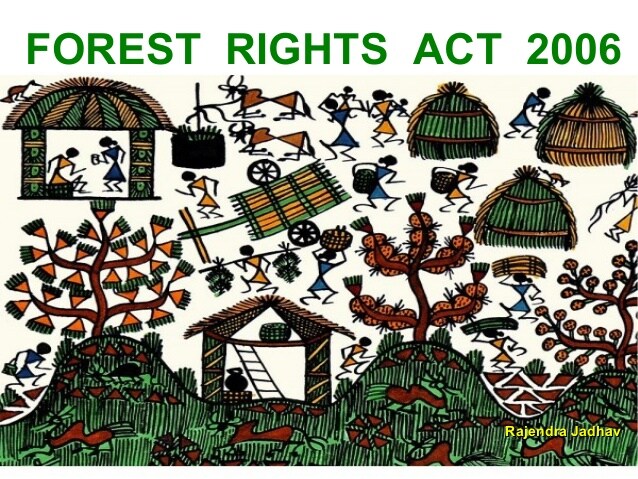ISSUES WITH FOREST RIGHTS ACT
ISSUES WITH FOREST RIGHTS ACT

FOREST RIGHTS ACT
The act was passed in December 2006. It deals with the rights of forest-dwelling communities over land and other resources. The Act grants legal recognition to the rights of traditional forest dwelling communities, partially correcting the injustice caused by the forest laws.
Rights under the Act:
- Title rights – Ownership to land that is being farmed by tribals or forest dwellers subject to a maximum of 4 hectares; ownership is only for land that is actually being cultivated by the concerned family, meaning that no new lands are granted.
- Use rights – to minor forest produce (also including ownership), to grazing areas, to pastoralist routes, etc.
- Relief and development rights – to rehabilitation in case of illegal eviction or forced displacement; and to basic amenities, subject to restrictions for forest protection.
- Forest management rights – to protect forests and wildlife.
FRA is in existence for 15 years, Still, majority of the tribal communities in India are poor and landless. They practise small-scale farming, pastoralism, and nomadic herding. On the Human Development Index, the tribal-populated States always rank lower than the national average.
ISSUES IN IMPLEMENTATION
GRAM SABHA
- Act Requires the constitution of a Forest Rights Committee comprising members from within the village by conducting a Gram Sabha with two-thirds of the members present at the meeting.
- The process was not followed in many places.
- These committees were mostly constituted by the Panchayat Secretaries upon the directives received from District Magistrates at short notice.
- The nominations for members for the taluk-level and district-level committees were also not transparent.
WOMEN RIGHTS
- The contribution of women to the forest economy is well known.
- The FRA provides for equal rights in titles issued under the Act for women.
- They have the equitable role at every stage of decision-making. However, on the ground, the women were hardly visible in this regard.
DOCUMENTATION
- In the initial stages of implementation, there was insistence on satellite images as evidence while other admissible proofs were ignored, as happened in Gujarat. This resulted in mass rejections of claims by the authorities.
- In some villages around Bastar, Chhattisgarh, the plots claimed and the documents confirming the award did not match. Besides, the extent of land that was awarded was far smaller than what was claimed within the ceiling.
LACK OF AWARENESS
- Overall, poor awareness levels among the tribal people proved to be a handicap, especially in the scheduled areas which are remotely located.
- To effectively present claims, a fair understanding of the Act and its implementation process is necessary.
DECLINING PRODUCE, LIVELIHOODS
- Many tribal areas are witnessing a decline in the quality of forest produce in their vicinity, thus forcing them to look for other sources of livelihood.
- The recognition given to their lands under the FRA gave the tribal people a psychological boost. However, they possess lands (including the lands recognised under the FRA) that are small, of poor quality (particularly lands located on hill slopes) and are not very fertile.
- Lack of irrigation facilities forces them to depend only on rainfall. To enhance their income, they migrate to work as construction or road-laying labourers.
- Quality of education received by the youth in the remote districts, the possibility of acquiring meaningful jobs remains thin
SOME SUGGESTIONS
- Livelihoods of the locals would improve if horticulture practices are promoted in addition to bamboo and aloe vera plantations with an assured market.
- Promote medical and ecotourism along the lines of the Kerala model
- Providing skill-based education with assured jobs on a large scale in proportion to the demand would do wonders in these areas.
- Evidence suggests that implementation was better in areas which were fairly close to urban settings or where accessibility was easy. In these places, most Central and State government schemes and programmes such as Deendayal Upadhyaya Gram Jyoti Yojana, Janani Shishu Suraksha Karyakram, Mahatma Gandhi National Rural Employment Guarantee Scheme, were implemented, empowering the people to assert their positions.
THE WAY FORWARD
The FRA was never going to be a panacea to address all the issues of the tribal people, but it is important. To improve the condition of the tribal people, especially those living in remote areas, there needs to be a push on every possible aspect of their socioeconomic life. This can be attained if schemes and programmes already drafted for the tribal people are implemented in letter and spirit across the country. With protective laws like the Panchayats (Extension to Scheduled Areas) Act, 1996, in place, it is only a matter of will. One way forward could be to induct people who are sensitive to the cause of tribal people in the decision-making process at every stage.

